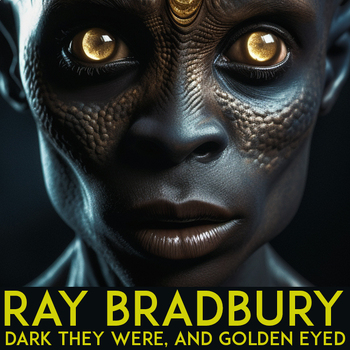Table of Contents
ToggleIntroduction
Dark They Were, And Golden Eyed Summary By Ray Bradbury Dark They Were, and Golden-Eyed is a short science fiction story written by Ray Bradbury and first published in 1949. It is part of his celebrated anthology The Martian Chronicles, a collection of stories that explore the human colonization of Mars. In this particular story, Bradbury delves into themes of identity, transformation, and the psychological and physical impacts of living in an alien environment. Dark They Were, And Golden Eyed Summary By Ray Bradbury
Set in the early days of humanity’s attempts to colonize Mars, the story follows the experiences of the Bittering family, who are among the first humans to settle on the Martian landscape. As they attempt to make a new life for themselves on the red planet, they begin to undergo subtle but profound changes. These transformations serve as a metaphor for the alienation, adaptation, and cultural assimilation that can occur when people are removed from their familiar surroundings and thrust into a completely different world.
The title of the story, Dark They Were, and Golden-Eyed, hints at the theme of metamorphosis and loss of identity, with the “golden eyes” representing the strange and unsettling changes that the characters experience as they adjust to life on Mars. As their physical forms change, they also lose touch with their past, and the story explores how humans can change and adapt, sometimes at the cost of their own identity. Dark They Were, And Golden Eyed Summary By Ray Bradbury
Summary of Dark They Were, and Golden-Eyed by Ray Bradbury
Part I: Arrival on Mars
The story opens with the Bittering family—father Harry, mother Cora, and their two children, Dan and Laura—living in a small colony on Mars. The Bitterings were among the first Earth settlers to arrive on Mars, part of the early wave of colonizers who were sent to establish a human presence on the planet. They arrived with hopes of building a new life, free from the problems and conflicts that plagued Earth.
However, life on Mars is not easy. The planet is desolate, with harsh conditions and a hostile environment. The settlers have to rely on supplies shipped from Earth to survive. The Bitterings, like many others, face the challenge of adjusting to their new surroundings. They feel isolated and disconnected from their old life on Earth, yet they are determined to make the best of their situation.
As the story progresses, the Bitterings begin to experience strange changes, both physical and psychological, that mirror the environment of Mars. The planet’s gravity, atmosphere, and alien nature slowly begin to affect them in ways they do not fully understand.
Read More
Part II: Subtle Transformations
As the weeks and months pass, the Bitterings’ lives start to change in subtle, but disturbing ways. Harry Bittering, initially determined to maintain his Earthly identity and culture, begins to notice that the Martian environment is having a strange effect on him. He finds himself becoming increasingly disconnected from his previous life and habits, feeling as though he no longer belongs on Earth.
More troubling, the family begins to notice physical transformations. Their eyes start to change color, slowly turning a golden hue, a sign of their adaptation to the Martian atmosphere. At first, the family tries to resist the changes, but over time, they realize that they are powerless to stop the transformation. Their bodies, as well as their minds, are beginning to adapt to the Martian environment.
The children, Dan and Laura, show less resistance to these changes. They grow more attuned to the Martian landscape, even beginning to learn the language of the planet’s mysterious native inhabitants. Their growing connection to Mars further alienates them from their Earthly origins. They no longer care about returning to Earth, as they become more “Martian” in their thoughts, behaviors, and attitudes. Dark They Were, And Golden Eyed Summary By Ray Bradbury

Part III: The Loss of Earthly Identity
Cora Bittering is perhaps the last holdout, still clinging to the hope that they can return to Earth one day. She tries to maintain the family’s old ways, cooking Earth-style meals, keeping Earth customs, and resisting the idea that they are becoming part of Mars. However, her resistance gradually breaks down as she begins to feel the pull of the Martian way of life.
The final shift occurs when Harry Bittering finally accepts that the changes are irreversible. He abandons his longing for Earth and comes to terms with his new identity as a Martian. He no longer dreams of returning to Earth; in fact, the thought of it becomes distasteful to him. The Bitterings’ final acceptance of their new lives is symbolized by the transformation of their eyes—golden, like the native Martians.
The story ends with the realization that the Bittering family is lost to Earth forever. They are no longer Earthlings in any meaningful sense. In a final twist, the narrative suggests that Mars, in its alienness, has not only transformed the Bittering family physically, but it has also reshaped their cultural and spiritual identities. The Martian landscape has absorbed them completely, and they have become part of the planet’s mysterious, inscrutable nature. Dark They Were, And Golden Eyed Summary By Ray Bradbury
Themes and Analysis of Dark They Were, and Golden-Eyed
1. Identity and Transformation
At the heart of Dark They Were, and Golden-Eyed is the theme of identity. The Bittering family’s journey is one of profound transformation, both physical and psychological. As they begin to adopt characteristics of the Martians, they lose their Earthly identity, signaling the irreversible impact of the Martian environment on them. The changes are subtle at first, but as they accumulate, the family members become unrecognizable as Earthlings, both in appearance and in their desires.
This theme explores the idea that identity is not fixed but malleable. When placed in an unfamiliar environment, people may change in unexpected and profound ways. The story questions what it means to truly “belong” to a place and how external factors—such as environment, culture, and even biology—can reshape one’s sense of self.
2. The Alienation of Colonization
Another key theme is the alienation that accompanies colonization. The Bittering family is colonizing Mars, but they do not realize that they are also being colonized by the planet itself. Mars is not just a physical environment; it represents a force that is both alien and irresistible. While the settlers initially aim to conquer the planet and make it their own, they end up losing their own sense of identity to it.
The story suggests that colonization is a two-way process: while humans seek to change and dominate their new environment, the environment itself changes them. In this sense, Dark They Were, and Golden-Eyed can be seen as a critique of colonization and the effects it has not just on the land, but on the people who attempt to subdue it.
Read More
3. The Power of Environment
The story emphasizes the power of environment to shape behavior, identity, and destiny. Bradbury uses Mars as a metaphor for the unknown and the uncontrollable forces that shape human lives. The characters’ gradual physical transformation into Martians symbolizes how an environment can shape and alter a person in ways they cannot resist or even fully understand.
Mars becomes both a literal and symbolic force in the story—one that humans cannot easily control. This theme touches on the broader human experience: no matter how much people might try to hold onto their past or their roots, they are often shaped by the environments they inhabit, sometimes in ways they do not expect.
4. The Fear of Change and the Loss of Home
The Bittering family’s resistance to change—particularly Harry’s insistence on returning to Earth—is a natural human reaction to the fear of the unknown. The transformation they undergo represents a loss of everything familiar: Earth, family traditions, culture, and identity. For Harry, the idea of Mars becoming home is a terrifying one because it means losing his connection to everything that made him who he was.
This fear of change, however, ultimately proves futile, as the transformation is inevitable. The story reflects the tension between the desire to maintain one’s identity and the unavoidable forces of change. As the Bitterings come to accept their new life, the story suggests that the only way forward is to embrace change, even when it means losing parts of oneself. Dark They Were, And Golden Eyed Summary By Ray Bradbury

Conclusion
Dark They Were, and Golden-Eyed is a profound exploration of human identity, colonization, and transformation. Through the story of the Bittering family’s journey on Mars, Ray Bradbury examines how the forces of the environment—both physical and psychological—can shape and redefine individuals in ways they cannot anticipate or control. The story offers a meditation on the loss of self that often accompanies radical change and the ways in which humans adapt, sometimes at the cost of everything they once were. Through its haunting imagery and powerful themes, the story serves as a timeless reflection on the complexities of identity and the transformative power of place.
Read More
FAQ
Q: What is the significance of the title Dark They Were, and Golden-Eyed?
A: The title refers to the transformation that the Bittering family undergoes as they settle on Mars. The phrase “dark they were” reflects the way they lose their Earthly identity and become more alien, while “golden-eyed” refers to the physical change they experience, symbolizing their transformation into Martians. The golden eyes mark the final stage of their assimilation into the planet’s environment.
Q: Why does Harry Bittering resist the changes happening to him and his family?
A: Harry’s resistance stems from his deep attachment to Earth and his fear of losing his identity. He wants to maintain his connection to his past and resist the changes that Mars is forcing upon him. His struggle to return to Earth reflects his desire to preserve what is familiar and safe, in contrast to the unknown and unsettling nature of Mars.
Q: How does Dark They Were, and Golden-Eyed critique colonization?
A: The story critiques colonization by showing that it is a two-way process. While humans seek to colonize Mars, they themselves are colonized by the planet. The environment of Mars changes the Bittering family both physically and psychologically, reflecting the power of the unknown to alter and reshape people’s identities in unexpected ways. Dark They Were, And Golden Eyed Summary By Ray Bradbury
Q: What role does the Martian environment play in the story?
A: The Martian environment serves as both a literal setting and a metaphorical force that transforms the settlers. The harsh conditions of Mars, along with the influence of the planet’s alien nature, gradually strip the Bittering family of their Earthly identity, forcing them to adapt and become part of their new home.
Q: Is the story ultimately about loss or transformation?
A: While the story involves loss—of identity, of Earth, and of familiarity—it is also about transformation. The Bittering family’s journey is one of inevitable change, and the story explores how they adapt to their new environment, even if it means losing the person they once were. The narrative highlights both the sadness and the necessity of transformation when faced with an overwhelming force like colonization.
Read More
















